Publications
Imaginations: Journal Of Cross-Cultural Image Studies (Issue 9:2, 2018)
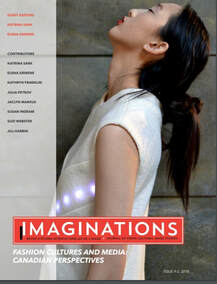
Editors: Katrina Sark and Elena Siemens
Katrina Sark: "The Canadian Fashion Scholars Network"
This special issue on Fashion Culture and Media is the first digital collection of scholarship and artistic contributions by the members of the Canadian Fashion Scholars Network. In my contribution to this issue I detail the history and objectives of this network, while the other articles address the representation of fashion across a variety of media—from hockey broadcasts to comics, novels to advertising campaigns, and films to urban imaginaries—, and engage critically with various constructions of fashion cultures. My co-editor Elena Siemens and I decided to focus on both fashion media and fashion cultures for this issue because they are inextricably linked, as the scholarly and artistic contributions to this volume demonstrate. The network’s goal is to foster a stronger community of fashion scholars and to expand the discipline of Fashion Studies across Canada. I believe that critical engagement with fashion media and fashion cultures is still largely underrepresented in Canadian Fashion Studies and would like, through this volume and other activities of the network, to foster and expand these fields of inquiry.
KEYWORDS: Canadian Fashion Culture and Media, Canadian Fashion Scholars Network
Download the magazine as pdf here.
Katrina Sark: "The Canadian Fashion Scholars Network"
This special issue on Fashion Culture and Media is the first digital collection of scholarship and artistic contributions by the members of the Canadian Fashion Scholars Network. In my contribution to this issue I detail the history and objectives of this network, while the other articles address the representation of fashion across a variety of media—from hockey broadcasts to comics, novels to advertising campaigns, and films to urban imaginaries—, and engage critically with various constructions of fashion cultures. My co-editor Elena Siemens and I decided to focus on both fashion media and fashion cultures for this issue because they are inextricably linked, as the scholarly and artistic contributions to this volume demonstrate. The network’s goal is to foster a stronger community of fashion scholars and to expand the discipline of Fashion Studies across Canada. I believe that critical engagement with fashion media and fashion cultures is still largely underrepresented in Canadian Fashion Studies and would like, through this volume and other activities of the network, to foster and expand these fields of inquiry.
KEYWORDS: Canadian Fashion Culture and Media, Canadian Fashion Scholars Network
Download the magazine as pdf here.
The Fashion Studies Journal (Issue No. 3, February, 2018)
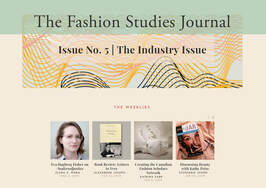
- Katrina Sark: “Creating the Canadian Fashion Scholars Network”
A network, in today’s digital world, is about instant access, connectivity, communication, quick exchange of ideas and resources, as well as about possibilities of creation and collaboration. The technological innovations of the past decade have made it easier to stay connected through social networking platforms, as well as to create online communication and research hubs that foster creative, professional, and academic collaborations. Speaking from experience, I can attest that technological innovations also make it possible to create different networks relatively quickly, with little to no cost, and without relying on the expertise of programmers or IT support. Building a network can start quickly, single-handedly, and spread widely and even globally with the help of other established networks and social media platforms.
KEYWORDS: Fashion Scholars Network, Canadian Fashion
Cultural Topographies of the New Berlin (New York: Berghahn, 2017)
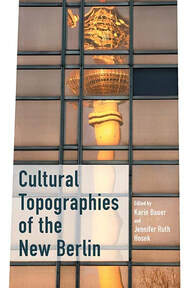
- Editors: Karin Bauer and Jennifer Hosek
- Katrina Sark, “Cultural History of Post-Wall Berlin: From Utopian Longing to Nostalgia for Babylon”
Since Unification and the end of the Cold War, Berlin has witnessed a series of uncommonly intense social, political, and cultural transformations. While positioning itself as a creative center populated by young and cosmopolitan global citizens, the “New Berlin” is at the same time a rich site of historical memory, defined inescapably by its past even as it articulates German and European hopes for the future. Cultural Topographies of the New Berlin presents a fascinating cross-section of life in Germany’s largest city, revealing the complex ways in which globalization, ethnicity, economics, memory, and national identity inflect how its urban spaces are inhabited and depicted.
KEYWORDS: Post-Wall Berlin, Documentary Films, Gentrification, Germany, Media, Art, Culture, Nostalgia
Journal of European Popular Culture (Vol. 8 No. 1, 2017)
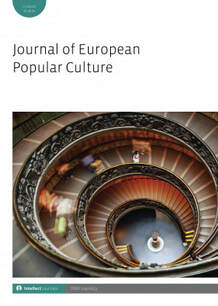
- Sark, Katrina. “Mauerpark: Berlin’s Gentrifying Scene Park,” pp. 39-56.
Mauerpark (dir. Dennis Karsten, 2011) is a documentary film shot in Berlin’s most notorious
park in Prenzlauer Berg in the summer of 2009. It portrays diverse protagonists –
artists, musicians, activists, performers and visitors – who frequent the park and
participate in its array of activities, such as mass karaoke, flea market, outdoor
basketball and other recreational sports, performances, arts, music, etc. Through
their narratives, the park is presented as the last public space in Prenzlauer Berg
that has not yet been completely gentrified and allows for sub- and countercultural,
unregulated creativity and leisure. This article examines Karsten’s film and the
gentrifying landscape of the New Berlin.
KEYWORDS: Berlin, Documentary Films, Gentrification, Germany
| Maurpark (K.Sark) | |
| File Size: | 5166 kb |
| File Type: | |
The Polyglot Magazine of Poetry and Art (Issue 2: Subjective Fashion, Fall 2017)
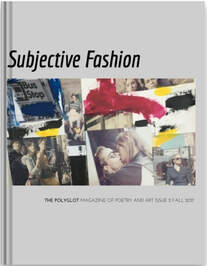
Guest Editor: Elena Siemens
Katrina Sark: “Alice, I Have Once Been, Indeed”
I have always been fascinated by the character of Alice in Wonderland and the various representations and imaginations of her in pop culture. I was first inspired to write a blog post entitled "Alice Does" about the various versions of Alice, and then a poem about an aging Alice that is included in this issue on Subjective Fashion. I imagine Alice as an eternally stylish and wise multilingual world-traveler, who has life-long friendships and loves, and many, many dresses.
KEYWORDS: Alice in Wonderland, Fashion, Dress, Dress-Making, Costume
Download the magazine as pdf here.
Katrina Sark: “Alice, I Have Once Been, Indeed”
I have always been fascinated by the character of Alice in Wonderland and the various representations and imaginations of her in pop culture. I was first inspired to write a blog post entitled "Alice Does" about the various versions of Alice, and then a poem about an aging Alice that is included in this issue on Subjective Fashion. I imagine Alice as an eternally stylish and wise multilingual world-traveler, who has life-long friendships and loves, and many, many dresses.
KEYWORDS: Alice in Wonderland, Fashion, Dress, Dress-Making, Costume
Download the magazine as pdf here.
Film International (volume 14, no. 2, 2016)
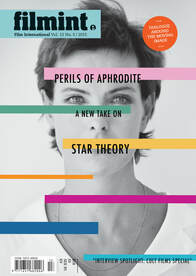
Katrina Sark: "Post-Wall Berlin Documentary Films" pp.70-88
The Berlin documentary film corpus produced after the Fall of the Wall in 1989 deserves closer attention and examination. The body of films that take post-Wall Berlin as their primary focus has grown exponentially since 1999, and then again after 2009. This can be explained by the changes in the city’s urban-economic development, when the very act of documenting became a way of making sense of the rapid changes and disappearances witnessed during that time. In a way, documenting can be seen as a way of engaging, preserving, questioning, affirming and even mourning the transformations evident in the New Berlin. I examine post-Wall Berlin documentary films because they have an immediacy of representation and engagement with the city and its various neighbourhoods, as well as its rapid transformations, which very few fiction films and literary works provide.
KEYWORDS: Germany, Documentary Film, Post-Wall Berlin, New Berlin, Gentrification
The Berlin documentary film corpus produced after the Fall of the Wall in 1989 deserves closer attention and examination. The body of films that take post-Wall Berlin as their primary focus has grown exponentially since 1999, and then again after 2009. This can be explained by the changes in the city’s urban-economic development, when the very act of documenting became a way of making sense of the rapid changes and disappearances witnessed during that time. In a way, documenting can be seen as a way of engaging, preserving, questioning, affirming and even mourning the transformations evident in the New Berlin. I examine post-Wall Berlin documentary films because they have an immediacy of representation and engagement with the city and its various neighbourhoods, as well as its rapid transformations, which very few fiction films and literary works provide.
KEYWORDS: Germany, Documentary Film, Post-Wall Berlin, New Berlin, Gentrification
| Post-Wall Berlin Documentaries (K. Sark) | |
| File Size: | 4737 kb |
| File Type: | |
Women in German Yearbook (Volume 32, 2016)
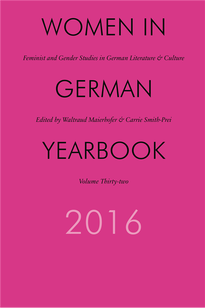
Katrina Sark: "Interview with Anne Wizorek"
Anne Wizorek is a German feminist activist and media consultant. She is the author of Weil ein #Aufschrei nicht reicht (Because an #Outcry is Not Enough, 2014), a book she wrote after her anti-sexism twitter campaign #aufschrei went viral in 2013. I first interviewed Anne in January 2016, shortly after the New Year's Eve attacks in Cologne, while she was in the process of collaborating on the #ausnahmslos campaign against sexism and racism. That interview can be accessed on my blog: Suites Culturelles. We then met in Berlin in June 2016 and recorded a podcast (in German) about feminism in Germany and Canada for her feminist online magazine Kleinerdrei. Finally, we met again in July 2016 and recorded a follow-up interview (this time in English) for the online contribution of the Women in German Yearbook about her current work. What follows below is a transcription of the above interview on Sound Cloud.
KEYWORDS: Germany, Feminism, Gender, Berlin, Digital Media
Anne Wizorek is a German feminist activist and media consultant. She is the author of Weil ein #Aufschrei nicht reicht (Because an #Outcry is Not Enough, 2014), a book she wrote after her anti-sexism twitter campaign #aufschrei went viral in 2013. I first interviewed Anne in January 2016, shortly after the New Year's Eve attacks in Cologne, while she was in the process of collaborating on the #ausnahmslos campaign against sexism and racism. That interview can be accessed on my blog: Suites Culturelles. We then met in Berlin in June 2016 and recorded a podcast (in German) about feminism in Germany and Canada for her feminist online magazine Kleinerdrei. Finally, we met again in July 2016 and recorded a follow-up interview (this time in English) for the online contribution of the Women in German Yearbook about her current work. What follows below is a transcription of the above interview on Sound Cloud.
KEYWORDS: Germany, Feminism, Gender, Berlin, Digital Media
Film International (Volume 14, No. 1, 2016)
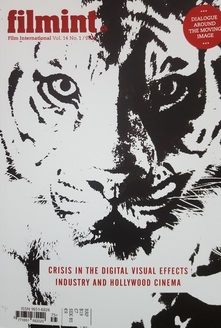
Issue: Dialogue around the Moving Image
Katrina Sark: "Everything We Want And The Documenting Of Personal Quests" pp.44-58
Beatrice Moeller's documentary film Everything We Want (Alles Was Wir Wollen, 2013) is a rare document of the female experience of what Carolyn G. Heilbrun (1988) described as questing – pursuing a personal quest. With the help of three female protagonists and their mothers, Moeller constructs an observational document of contemporary Berlin women and their various struggles in personal, professional and spiritual quests. I examine the film in relation to feminist scholarship.
KEYWORDS: Documentary, Feminism, Gender, Berlin, German Cinema
Katrina Sark: "Everything We Want And The Documenting Of Personal Quests" pp.44-58
Beatrice Moeller's documentary film Everything We Want (Alles Was Wir Wollen, 2013) is a rare document of the female experience of what Carolyn G. Heilbrun (1988) described as questing – pursuing a personal quest. With the help of three female protagonists and their mothers, Moeller constructs an observational document of contemporary Berlin women and their various struggles in personal, professional and spiritual quests. I examine the film in relation to feminist scholarship.
KEYWORDS: Documentary, Feminism, Gender, Berlin, German Cinema
| Everything We Want (K. Sark) | |
| File Size: | 1076 kb |
| File Type: | |
Montréal Chic: A Locational History Of Montreal Fashion (Bristol: Intellect, 2016)
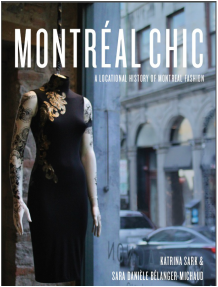
After co-authoring Berliner Chic (2011) and assisting with the research on Wiener Chic (2013) I completed the third book in the series, on Montreal fashion culture - the first in the series that focuses on Canadian fashion history and culture. Just as the other two books, published by the British publishing house, Intellect, Montréal Chic outlines the intersections of fashion and other cultural fields, such as film, music, museums, and the contemporary fashion scene in Montreal, and provides a well-researched view into the urban culture of Montreal. Simultaneously, the study attempts to call for a re-conceptualization of traditional value systems that privilege the fashion industry (which in the case of Montreal and other former manufacturing capitals has deteriorated in the course of globalization and creative economies) over fashion culture.
In this third volume, I focused specifically on gender issues, the roles of women in fashion production, consumption, and exhibition, women’s labour, as well as gay, lesbian, and transgendered representations in film, media, fashion and culture. It was important to me not only to expand the field of Canadian Fashion Studies, but to focus on gender issues and representations within Urban Cultural Studies as well. Both the Berlin and Montreal volumes are dedicated to the women of Berlin and of Montreal respectively because I was inspired by their hard work and dedication to telling the (untold and underrepresented) stories of their cities through fashion.
KEYWORDS: Montreal, fashion history, fashion scene, fashion economy, fashion and technology
In this third volume, I focused specifically on gender issues, the roles of women in fashion production, consumption, and exhibition, women’s labour, as well as gay, lesbian, and transgendered representations in film, media, fashion and culture. It was important to me not only to expand the field of Canadian Fashion Studies, but to focus on gender issues and representations within Urban Cultural Studies as well. Both the Berlin and Montreal volumes are dedicated to the women of Berlin and of Montreal respectively because I was inspired by their hard work and dedication to telling the (untold and underrepresented) stories of their cities through fashion.
KEYWORDS: Montreal, fashion history, fashion scene, fashion economy, fashion and technology
Synoptique: online Journal of Film and Moving Image Studies (4:2, March 2016)
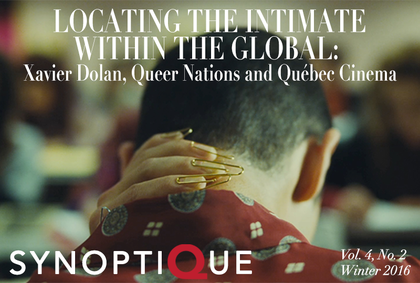
Issue: Locating the Intimate within the Global: Xavier Dolan, Queer Nations and Québec Cinema
Katrina Sark: "Viewing Laurence Anyways: Three Perspectives: The Language of Fashion and (Trans)Gender in Dolan’s Laurence Anyways"
In August 2012, after the release of Xavier Dolan’s third film, Laurence Anyways, Montréal’s Musée des beaux-arts hosted an event entitled the “Colour-Block Party” in conjunction with its exhibition on “Tom Wesselmann: Beyond Pop Art” and the annual Festival Mode et Design, bringing together young local designers whose creations were inspired by pop art and the colour-block style which Dolan explored in his films. The sea of bright colours worn by the museum guests complemented Wesselmann’s colour celebrations on the walls and the local designers’ fashion creations on display, and alluded to a scene from Dolan’s Laurence Anyways, when brightly-coloured pieces of clothing fall from the sky and envelop the two main protagonists. The Colour-Block event marked an important intersection of Montréal fashion, art, film, and cultural scenes, underscoring the collaborative and inter-connected nature of its creative industries.
KEYWORDS: Xavier Dolan, film and fashion, colour blocks
Katrina Sark: "Viewing Laurence Anyways: Three Perspectives: The Language of Fashion and (Trans)Gender in Dolan’s Laurence Anyways"
In August 2012, after the release of Xavier Dolan’s third film, Laurence Anyways, Montréal’s Musée des beaux-arts hosted an event entitled the “Colour-Block Party” in conjunction with its exhibition on “Tom Wesselmann: Beyond Pop Art” and the annual Festival Mode et Design, bringing together young local designers whose creations were inspired by pop art and the colour-block style which Dolan explored in his films. The sea of bright colours worn by the museum guests complemented Wesselmann’s colour celebrations on the walls and the local designers’ fashion creations on display, and alluded to a scene from Dolan’s Laurence Anyways, when brightly-coloured pieces of clothing fall from the sky and envelop the two main protagonists. The Colour-Block event marked an important intersection of Montréal fashion, art, film, and cultural scenes, underscoring the collaborative and inter-connected nature of its creative industries.
KEYWORDS: Xavier Dolan, film and fashion, colour blocks
| Laurence Anyways - Synoptique (K. Sark) | |
| File Size: | 5278 kb |
| File Type: | |
Fashion Theory Journal (Volume 19.3, June 2015)
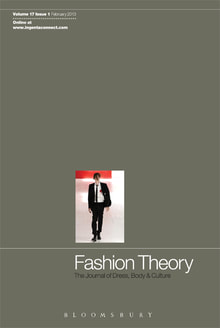
Katrina Sark and Sara Danièle Bélanger-Michaud: "Montréal Chic: Institutions of Fashion – Fashions of Institutions"
This article examines and contrast the fashion collections at three of Montréal’s cultural institutions, the Musée McCord, an urban and historical museum that houses over 18,000 pieces of costume and textile artifacts, the Musée du Costume et du Textile du Québec, which owns and exhibits a collection of 8000 items worn, collected, and donated by Québecers and contemporary fashion by Montréal-based designers, and the Musée des Beaux-Arts de Montréal, whose director Nathalie Bondil has made locally-produced international fashion exhibitions one of the key point of its curatorial practice since 2008.
Fashion Theory takes as its starting point a definition of "fashion" as the cultural construction of the embodied identity. The importance of studying the body as a site for the deployment of discourses has been well established in a number of disciplines. Until Fashion Theory’s launch in 1997 the dressed body had suffered from a lack of critical analysis. Increasingly scholars have recognized the cultural significance of self-fashioning, including not only clothing but also such body alterations as tattooing and piercing.
KEYWORDS: Montreal, fashion and museums, fashion exhibbitions
This article examines and contrast the fashion collections at three of Montréal’s cultural institutions, the Musée McCord, an urban and historical museum that houses over 18,000 pieces of costume and textile artifacts, the Musée du Costume et du Textile du Québec, which owns and exhibits a collection of 8000 items worn, collected, and donated by Québecers and contemporary fashion by Montréal-based designers, and the Musée des Beaux-Arts de Montréal, whose director Nathalie Bondil has made locally-produced international fashion exhibitions one of the key point of its curatorial practice since 2008.
Fashion Theory takes as its starting point a definition of "fashion" as the cultural construction of the embodied identity. The importance of studying the body as a site for the deployment of discourses has been well established in a number of disciplines. Until Fashion Theory’s launch in 1997 the dressed body had suffered from a lack of critical analysis. Increasingly scholars have recognized the cultural significance of self-fashioning, including not only clothing but also such body alterations as tattooing and piercing.
KEYWORDS: Montreal, fashion and museums, fashion exhibbitions
| Montreal Chic: Institutions of Fashion (K. Sark) | |
| File Size: | 1174 kb |
| File Type: | |
Descant 166: The Berlin Project (Volume 45, Number 3, Fall 2014)
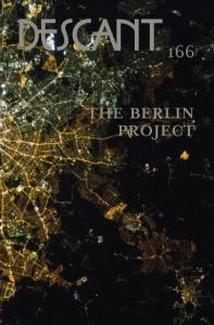
Katrina Sark: “Berlin, May 1946,” pp. 1-6.
Katrina Sark: “Berlin Freedom – November 9, 2009,” pp. 187-190.
Descant is a quarterly journal publishing new and established contemporary writers and visual artists from Canada and around the world. Begun in 1970 as a mimeograph, Descant has evolved into an exquisitely produced journal of international acclaim. Descant is devoted to the discovery and development of new writers, and to placing their work in the company of celebrated writers. After 45 years, Descant has now closed.
KEYWORDS: Berlin, post-Wall, reunification, 20th anniversary of the fall of the Wall
Katrina Sark: “Berlin Freedom – November 9, 2009,” pp. 187-190.
Descant is a quarterly journal publishing new and established contemporary writers and visual artists from Canada and around the world. Begun in 1970 as a mimeograph, Descant has evolved into an exquisitely produced journal of international acclaim. Descant is devoted to the discovery and development of new writers, and to placing their work in the company of celebrated writers. After 45 years, Descant has now closed.
KEYWORDS: Berlin, post-Wall, reunification, 20th anniversary of the fall of the Wall
|
| ||||||||||||
Imaginations: Journal of Cross-Cultural Image Studies (2014)
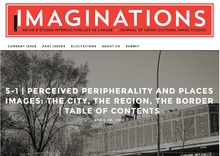
Katrina Sark: “Interview: Artist Profile and Photography”
Imaginations is a multilingual, open-access journal of international visual cultural studies. It is published twice yearly and is double-blind peer-reviewed. As a knowledge democracy project, Imaginations is free to submit to and free to read. Founded at the University of Alberta in 2010, the journal is funded by the federal granting agency of the Social Sciences and Humanities Research Council of Canada (SSHRC).
Imaginations showcases artistic work and scholarly research. It focuses on innovative artistic practices and interdisciplinary, intercultural theoretical understandings of images, screens and visual culture. The journal provides an online installation venue for original artwork and publishes academic articles in original languages and translated into French or English.
KEYWORDS: Cities and culture, photography, Montreal
Download the artist profile as a pdf.
Imaginations is a multilingual, open-access journal of international visual cultural studies. It is published twice yearly and is double-blind peer-reviewed. As a knowledge democracy project, Imaginations is free to submit to and free to read. Founded at the University of Alberta in 2010, the journal is funded by the federal granting agency of the Social Sciences and Humanities Research Council of Canada (SSHRC).
Imaginations showcases artistic work and scholarly research. It focuses on innovative artistic practices and interdisciplinary, intercultural theoretical understandings of images, screens and visual culture. The journal provides an online installation venue for original artwork and publishes academic articles in original languages and translated into French or English.
KEYWORDS: Cities and culture, photography, Montreal
Download the artist profile as a pdf.
| Imaginations Artists Profile and Interview: K. Sark | |
| File Size: | 85 kb |
| File Type: | |
World Film Locations: Berlin (Bristol: Intellect, 2012)
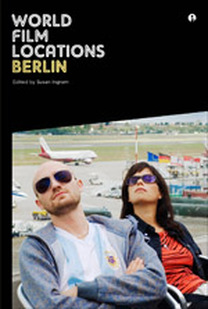
Editor: Susan Ingram
Katrina Sark: "Spotlight: Baustelle Berlin"
Scene descriptions: "Sommer vorm Balkon," "Die Legende von Paul und Paula," "Das Leben der Anderen," "Wir sind die Nacht"
Photography contributions: Berlin film locations
The World Film Locations series explores and reveals the relationship between the city and cinema by using a predominantly visual approach perfectly suited to the medium of film. The city continues to play a central role in a multitude of films, helping us to frame our understanding of place and of the world around us. Whether as elaborate directorial love letters or as time specific cultural settings, the city acts as a vital character in helping to tell a story.
KEYWORDS: Berlin, film locations, scene descriptions, reunification
Katrina Sark: "Spotlight: Baustelle Berlin"
Scene descriptions: "Sommer vorm Balkon," "Die Legende von Paul und Paula," "Das Leben der Anderen," "Wir sind die Nacht"
Photography contributions: Berlin film locations
The World Film Locations series explores and reveals the relationship between the city and cinema by using a predominantly visual approach perfectly suited to the medium of film. The city continues to play a central role in a multitude of films, helping us to frame our understanding of place and of the world around us. Whether as elaborate directorial love letters or as time specific cultural settings, the city acts as a vital character in helping to tell a story.
KEYWORDS: Berlin, film locations, scene descriptions, reunification
| Baustelle Berlin (by K.Sark) | |
| File Size: | 134 kb |
| File Type: | |
Seminar: A Journal of Germanic Studies (Volume XLVIII, Nr. 2, May 2012)
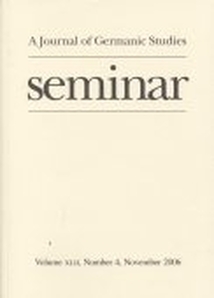
Katrina Sark, "Fashioning a New Brand of Germanness: 2006 World Cup and Beyond" pp.254-66
Founded in 1965, Seminar is one of the leading journals today for the study of Germanic literature, media and culture. It seeks to publish the highest-quality scholarship on a range of fields including philology, philosophy, aesthetics, media studies, visual culture, gender studies, and transnationalism in so far as they relate to German-language material or other languages in a German-cultural context. Jointly sponsored by the Canadian Association of University Teachers of German and the German division of the Australasian Universities Language and Literature Association, the journal endeavors to promote German studies across a broad international context.
KEYWORDS: German post-Wall identity, post-Wall Berlin, reunification, culture, World Cup 2006
Founded in 1965, Seminar is one of the leading journals today for the study of Germanic literature, media and culture. It seeks to publish the highest-quality scholarship on a range of fields including philology, philosophy, aesthetics, media studies, visual culture, gender studies, and transnationalism in so far as they relate to German-language material or other languages in a German-cultural context. Jointly sponsored by the Canadian Association of University Teachers of German and the German division of the Australasian Universities Language and Literature Association, the journal endeavors to promote German studies across a broad international context.
KEYWORDS: German post-Wall identity, post-Wall Berlin, reunification, culture, World Cup 2006
| Fashioning a New Brand of Germanness (by K. Sark) | |
| File Size: | 79 kb |
| File Type: | |
Berliner Chic: A Locational History of Berlin Fashion (Bristol: Intellect, 2011)
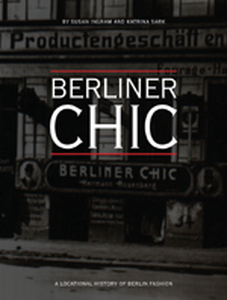
Susan Ingram, York University
Katrina Sark, McGill University
Since becoming the capital of reunited Germany, Berlin has had a dose of global money and international style added to its already impressive cultural veneer. Once home to emperors and dictators, peddlers and spies, it is now a fashion showplace that attracts the young and hip. Moving beyond descriptions of Berlin's fashion industry and its ready-to-wear clothing, Berliner Chic charts the turbulent stories of entrepreneurially-savvy manufacturers and cultural workers striving to establish their city as a fashion capital, and being repeatedly interrupted by politics, ideology, and war. There are many stories to tell about Berlin's fashion industry and Berliner Chic tells them all with considerable expertise.
KEYWORDS: Berlin fashion history, photography, museums, film, music
Available on Google Books.
Katrina Sark, McGill University
Since becoming the capital of reunited Germany, Berlin has had a dose of global money and international style added to its already impressive cultural veneer. Once home to emperors and dictators, peddlers and spies, it is now a fashion showplace that attracts the young and hip. Moving beyond descriptions of Berlin's fashion industry and its ready-to-wear clothing, Berliner Chic charts the turbulent stories of entrepreneurially-savvy manufacturers and cultural workers striving to establish their city as a fashion capital, and being repeatedly interrupted by politics, ideology, and war. There are many stories to tell about Berlin's fashion industry and Berliner Chic tells them all with considerable expertise.
KEYWORDS: Berlin fashion history, photography, museums, film, music
Available on Google Books.
| Berliner Chic | |
| File Size: | 5554 kb |
| File Type: | |
CineAction (Issue 80, 2010)
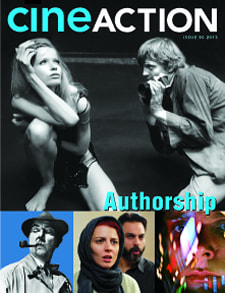
Katrina Sark, "City Spaces and National Identity" pp.56-59
There is a noticeable tendency to focus on the Eastern topography in recent German films set in Berlin (Goodbye Lenin!, The Lives of Others, Summer in Berlin). Urban space becomes imbued with meaning precisely because of the directors’ choice to shoot on location in the former East. This paper will analyze the intersections of cinematically constructed city spaces and the way in which we engage with them. This engagement with space also raises socially vital questions of East-West dichotomies and the construction of a new, post-reunification German identity. How do Berlin films approach the cosmopolitan concept of ‘Berlinness’ (as opposed to ‘Germanness’)? What is a metropolitan notion of identity vs. a national one (particularly in the post-national European climate).
KEYWORDS: German film, Berlin, post-Wall
Full text available at The Free Library
There is a noticeable tendency to focus on the Eastern topography in recent German films set in Berlin (Goodbye Lenin!, The Lives of Others, Summer in Berlin). Urban space becomes imbued with meaning precisely because of the directors’ choice to shoot on location in the former East. This paper will analyze the intersections of cinematically constructed city spaces and the way in which we engage with them. This engagement with space also raises socially vital questions of East-West dichotomies and the construction of a new, post-reunification German identity. How do Berlin films approach the cosmopolitan concept of ‘Berlinness’ (as opposed to ‘Germanness’)? What is a metropolitan notion of identity vs. a national one (particularly in the post-national European climate).
KEYWORDS: German film, Berlin, post-Wall
Full text available at The Free Library
| City Spaces and National Identity (by K. Sark) | |
| File Size: | 1984 kb |
| File Type: | |
Berlin's Culturescape: In the Twentieth Century (Regina: CPRC, 2008)
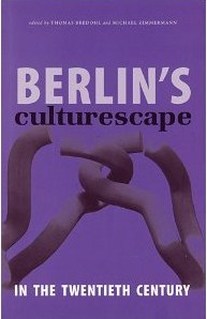
Editors: Thomas Bredohl and Michael Zimmermann
Katrina Sark, “Fashion among Ruins: Fashion in Berlin 1945-46” pp. 113-128.
My chapter in this volume examines the resurrection of Berlin fashion industry in the ruins of 1945.
Fashion plays an increasingly important role in Berlin today, with the re-organization of Berlin’s Kunstgewerbemuseum into a fashion museum in the recent years, and various exhibitions on fashion taking place at several museums in Berlin simultaneously. Today there are more and more attempts by the curators to tell the story of the Berlin fashion industry. This paper follows this tradition, examining the revival of the fashion industry and women’s work within that industry, as well as the social conditions in which the industry sprung up after the allied liberation in 1945-46. The juxtaposition of fashion and ruins opens up social questions of the production and manufacturing conditions, as well as the role of women in the post-war “economy of pleasure.”
KEYWORDS: Berlin fashion, war ruins, post-war fashion
Katrina Sark, “Fashion among Ruins: Fashion in Berlin 1945-46” pp. 113-128.
My chapter in this volume examines the resurrection of Berlin fashion industry in the ruins of 1945.
Fashion plays an increasingly important role in Berlin today, with the re-organization of Berlin’s Kunstgewerbemuseum into a fashion museum in the recent years, and various exhibitions on fashion taking place at several museums in Berlin simultaneously. Today there are more and more attempts by the curators to tell the story of the Berlin fashion industry. This paper follows this tradition, examining the revival of the fashion industry and women’s work within that industry, as well as the social conditions in which the industry sprung up after the allied liberation in 1945-46. The juxtaposition of fashion and ruins opens up social questions of the production and manufacturing conditions, as well as the role of women in the post-war “economy of pleasure.”
KEYWORDS: Berlin fashion, war ruins, post-war fashion
| Fashion among Ruins (by K. Sark) | |
| File Size: | 5360 kb |
| File Type: | |
